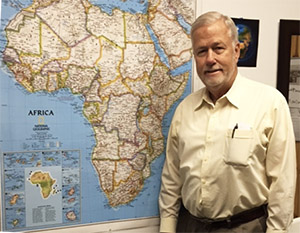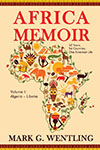The Volunteer Who Provided a Clear-eyed Look at Africa — Mark Wentling (Honduras, Togo)
(A major portion of this profile was drawn from an article in the Foreign Service Journal & Peace Corps WorldWide)
by Jeremiah Norris (Colombia 1963–65)
•

Mark Wentling
Mark Wentling served as a Peace Corps Volunteer in Honduras, 1967-69, and in Togo, 1970-73. He retired from the Senior Foreign Service in 1996, after serving as principal officer in six African
countries. Mark worked in Africa for the Peace Corps, non-governmental organizations, and as a contract employee for USAID. He has published eight books, including the three-volume African Memoir Years: 54  Countries, One American Life. (Vol I, Vol II, Vol III
Countries, One American Life. (Vol I, Vol II, Vol III
Mark recently published an article entitled “Much Cause for Worry” in the September issue of the Foreign Service Journal, giving readers an uncompromising perspective of Africa in a contemporary context. His views emanate from having lived and worked in every corner of this continent, visiting 54 countries over the past 50 years. While he believes that peace, stability and good leadership are essential to the advancement of any country, the opposite exists in many African countries. All but 3 of the 31 countries listed on the lowest human development category of the UN’s Human Development Index (HDI) are in Africa. This has occurred despite the fact that many development efforts by the World Bank, USAID, WHO, etc. have expended billions over the decades.
While some progress has been made, for instance with the average adult literacy rate having increased from 49% to 66% from 1985 to 2019, and infant mortality rate improved from 139 to 49 per 1,000 live births in the 1970-2020 period. It is difficult to find in any African country where competent and honest governance prevails and where justice is rendered to its people. Violent conflict exists in 20 countries and potential civil disturbances in other countries cannot be ruled out.
All African countries are coping with the tsunami of a fast growing population. The youthful structure of that population has an average age of 19.7 years compared to 38.5 years in the U. S. Rapid population gains is outstripping development gains. In 2050 Nigeria, Africa’s most populated country, will have as many people as the U. S. in a land area that is one-eleventh the size of the U.S.
To give perspective to this issue, Mark comments that there are almost four times the number of people in Africa today then when he first arrived on the continent in 1970. Population projections estimate that its total population will continue to expand, going from about 1.4 billion today possibly to more than 4 billion in 2100. He is at a loss to see how Africa — and the world will cope with this increase.
The phenomenal growth of Africa’s population underscores the fact that it is the only region in the world which has not achieved a demographic transition — i.e., its birth rates remain high. When the dire consequences of such unprecedented population growth is coupled with a massive rural exodus to urban settings, Africa’s development prospects are without parallel.
The world’s future workforce will be in Africa, meriting our greater attention. While the working population in high-income countries is dwindling, the overall working population in Africa is increasing, Yet, millions of Africans remain jobless. A huge constraint on the use of this potential labor is the low educational and health status of its people. In most countries, a substantial percentage is illiterate. And the prevalence of tropical illness, such as malaria, limits the contributions of its workforce.
Africa is also the only region in the world that has not had an agricultural productivity transition. Crop yields remain a fraction of what they are in other regions, and average farm size is small compared to other nations. The average age of the African farmer is increasing as young people abandon rural life for the towns and cities. The lack of secure rights to land impedes any progress in dealing with Africa’s productivity failure. Only an estimated 10% of African farmers have legal title to their land. Africa is the only region in the world where land ownership has not become fundamental to successful farming.
The picture is further complicated by the fact that ongoing conflicts have resulted in more than 20 million people fleeing their homes, either to become internally displaced or refugees in neighboring countries. Given the rise in violent conflicts, this number is expected to grow.
Western aid agencies focused on better schools, health clinics and water supplies over the past 20 years. China has made inroads by financing Africa’s large infrastructure deficit, providing expertise, funds and workers to construct deep water ports, roads, railroads, dams, and leasing hundreds of thousands of hectares of farm land. But, China doesn’t use local labor for these projects, and, the agricultural production from leased lands goes to China.
The availability of external finance for new projects isn’t a problem. More money leaves Africa illicitly than goes through legitimate channels. Western countries have found that they cannot compete with China, and it does not express concerns over the environment or Human Rights. Additionally, the high amount of loans to African countries by China has raised fears that it is causing a debt trap for Africa.
The title, “Much Cause for Worry” of Mark’s paper aptly presents to readers a clear-eyed look at Africa in a contemporary context, earning him a well-deserved Profile in Citizenship.
No comments yet.
Add your comment